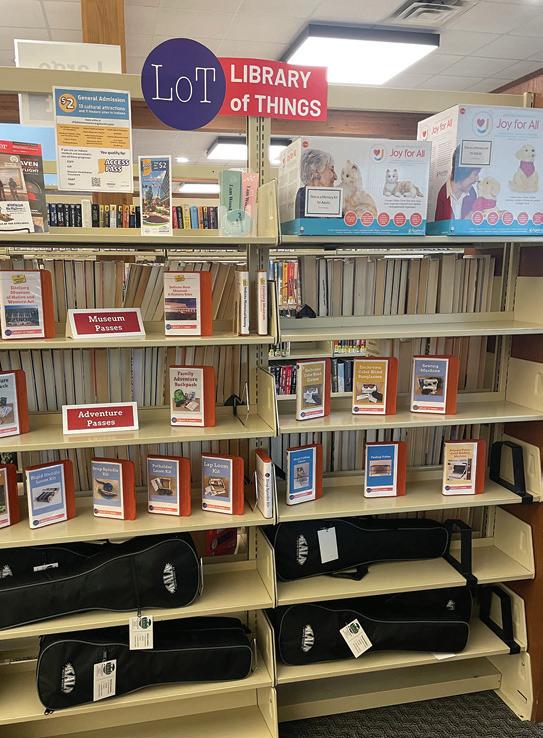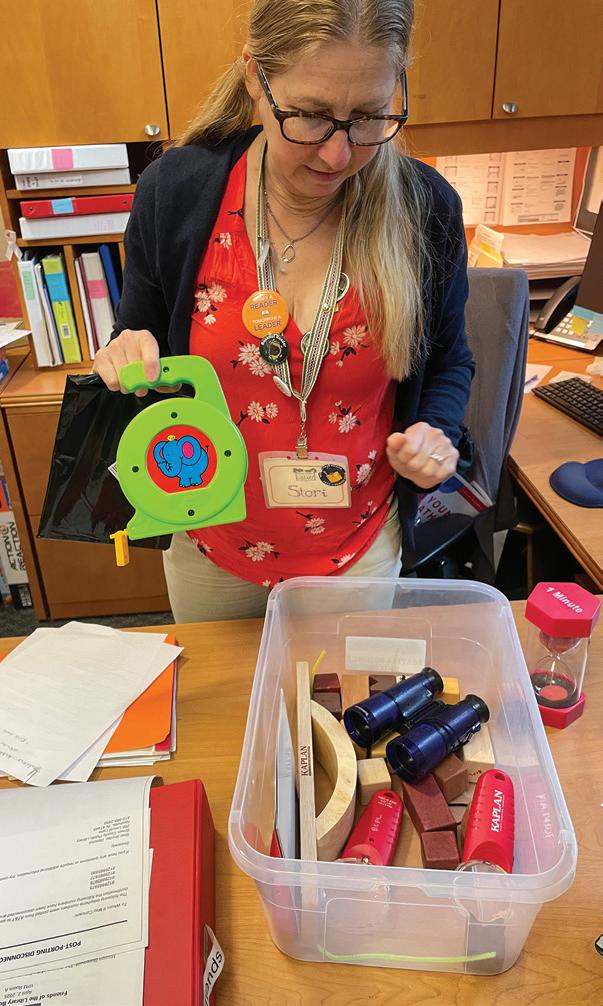
5 minute read
Library of Things
~story and photos by Bob Gustin
Public libraries in America have long been a place where ordinary citizens can share the wealth of a community, borrowing items free of charge, then returning them so others can do the same.
Benjamin Franklin founded the first free lending library in 1790, and since then, the items citizens could borrow have grown from books, documents and periodicals to include vinyl records, videotapes, CDs and DVDs, and finally an array of media accessed electronically, among other things.
That list keeps expanding, and the collection of the Brown County Public Library in Nashville keeps growing with it.
One shelving unit at the library, now titled the “Library of Things,” offers patrons the ability to check out portable tables and chairs, a sewing machine, reduced admission to statewide attractions, glasses which may allow colors to be seen by those with color blindness, weaving looms and supplies, enough ukuleles to put together a little orchestra, and more.
The glasses for color-blind people were among the first items offered by the library. She said the glasses are expensive, ranging into the hundreds of dollars, and don’t work for everyone. But by checking out a pair of them, patrons can try them out and see for themselves before committing to the purchase.
“One man checked out a pair and came back to say he was able to see colors for the first time. It made him cry,” Snyder said.
Two of the newest items in the collection are a lifelike robotic kitten and puppy. These are not children’s toys but are intended to be “companion pets” for older adults with memory problems, including dementia, and can also be checked out by caregivers.
The feline model purrs, blinks its eyes, moves its head, feet and legs, meows, and takes a catnap. The canine counterpart barks and rolls around, blinks and moves about. Both have brushable soft fur, and the library kits come with rechargeable batteries and a charging unit.
The battery-operated pets are a gift to the library from Thrive Alliance. The Columbus-based organization serves as the state’s Agency on Aging for Bartholomew, Brown, Decatur, Jackson, and Jennings counties.
Other memory kits in the Library of Things include activities and material to explore art and different parts of the world.
Tables and chairs are library property, are usually kept in storage, and brought out only for special events, but Snyder said libraries are by nature frugal, and it made sense to lend them out to help people get through a one-day event.
“That’s what we do here, we share stuff,” she said. Checkout times vary from one to three weeks.
Family-focused backpacks are available to check out, including a nature-themed one which includes a state park pass, field guides, binoculars, and a magnifying glass. Another backpack sponsored by the Special Olympics includes items and activities for special needs children.
The library also has “hot spots” available for checkout, which allow users connection to the internet without paying for the service but is not intended as a replacement for Internet hookup. There is always a hold list for the limited number of hot spots available, and service to individual units are suspended the morning they are due back. These units can be checked out for a one-week period. A bank of computers is available for public use during regular library hours.
Sidewalk kits can be checked out for use on the sidewalks in the library’s children’s garden, and Legos and other items can be used inside the library.
“Kids get tired of the things they have at home, and toys are expensive,” Snyder said. “This is a great way for a family to come here and let the kids play with new toys.”
Local tax money is not used for the Library of Things, with 90 percent of the funds for items coming from discretionary funds raised by the Friends of the Library nonprofit group. Other items are purchased with grants or donated to the library, such as the robotic pets.
Friends of the Library recently raised funds to purchase an electric vehicle for the library staff. Money raised, in conjunction with a $15,000 grant from the Brown County Community Foundation, purchased the Toyota vehicle to replace a 2009 Dodge Caravan.
Solar panels and charging stations installed in the library parking lot in 2022 mean the library now has zero fuel costs for its vehicle, and the library’s electricity costs have been eliminated except for a monthly connectivity fee. The library installed an array of 324 solar panels, costing nearly $850,000, without raising taxes or going into debt. The savings are expected to pay for the cost of the panels and their carport-style structures within 10 years.
Funding cuts proposed or enacted on the state and federal levels will have an impact on libraries, Snyder said, and she urged people to stay engaged with decisions made by government officials.
The Brown County Public Library, located at 205 Locust Lane in Nashville, is open 9 a.m. to 7 p.m. Monday through Thursday, 10 a.m. to 5 p.m. Friday, and 10 a.m. to 4 p.m. Saturday.
Bob Gustin is a member of the Brown County Public Library Board of Directors.


